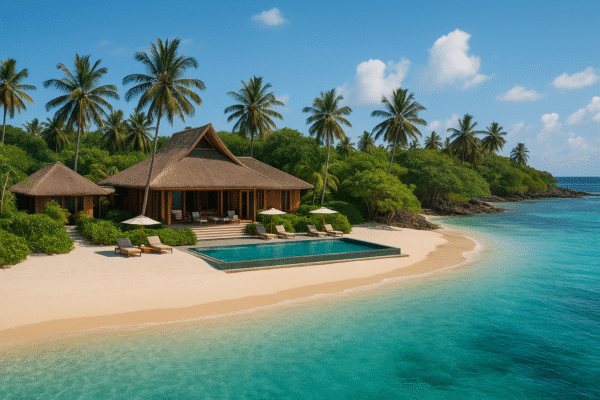Africa’s high-end hospitality sector is experiencing a renaissance — and at the heart of this transformation lies a new breed of ultra-exclusive, nature-immersed destinations. Among the most extravagant is a $50,000-per-night private island retreat off the coast of Tanzania, developed and managed by the UAE’s prestigious Jumeirah Group, under the Jumeirah Privé brand. This elite hideaway isn’t just redefining African luxury—it’s setting a global benchmark.
Tanzania’s Rising Star: Private Island Luxury in a Marine Reserve
Located within a protected marine reserve in Tanzania, this invitation-only island resort offers complete privacy and ecological immersion for a nightly rate rivaling the world’s most opulent accommodations. Accessible only by private helicopter or catamaran, the resort offers a sprawling beachfront villa for exclusive use, complete with full staff, private chefs, and luxury yacht access.
More than just a lavish stay, this resort delivers an experiential escape: snorkeling in coral gardens, guided nature walks on untouched island terrain, and spa treatments under open skies. The destination reflects a trend among affluent travelers prioritizing seclusion, sustainability, and singularity in their travels.
A Dubai Royal’s Vision for African Luxury
The resort is part of a broader strategic push into Africa by the Jumeirah Group LLC, owned by the Dubai royal family and known for managing some of the world’s most luxurious properties, including the iconic Burj Al Arab in Dubai. The group’s Jumeirah Privé collection curates one-of-a-kind ultra-premium experiences around the world, and its latest African venture is emblematic of a growing confidence in the continent’s luxury travel potential.
According to the Tanzania Tourism Board, the country welcomed over 1.8 million visitors in 2024, with a significant uptick in high-net-worth travelers from the Middle East, Europe, and Asia. The new resort taps into this trend, offering a gateway to one of Africa’s most pristine coastal regions while boosting Tanzania’s appeal as a luxury destination.
Africa’s Untapped Wealth of High-End Experiences
Trevor Ward, Managing Director of W Hospitality Group, emphasizes that Africa remains one of the last great frontiers for upscale tourism development. “There is a growing appetite among the world’s wealthiest travelers for experiences that combine privacy, authenticity, and exclusivity,” Ward explains.
From vineyard estates in South Africa’s Western Cape to gorilla trekking lodges in Rwanda and Uganda, the continent offers a rich mosaic of opportunities for elite tourism. Now, private island resorts like the Tanzanian retreat are adding new dimensions to the mix.
Recent data from the World Travel & Tourism Council (WTTC) shows that Africa’s luxury tourism market is growing at over 6% annually, outpacing global averages. In 2023, the high-end travel sector contributed more than $70 billion to the African economy, a figure projected to rise as new infrastructure, investment, and global marketing take hold.
Beyond Safari: Redefining the African Experience
While Africa has long been synonymous with safari tourism, today’s affluent travelers are increasingly seeking more nuanced and varied experiences. The rise of luxury coastal resorts, private conservation areas, and heritage-rich hospitality offerings points to a broader shift. According to the African Travel and Tourism Association (ATTA), this shift is redefining Africa as not only adventurous and wild but also refined and cosmopolitan.
In addition to Tanzania, countries like Mozambique, Kenya, Namibia, and Seychelles are also attracting investment from major international hotel groups and private equity firms. Many of these new projects are backed by Gulf state investors, particularly from the UAE and Saudi Arabia, eager to diversify portfolios and tap into Africa’s tourism potential.
Sustainable Luxury and Community Impact
The new Tanzanian island resort underscores a broader focus on sustainability and community inclusion in Africa’s luxury tourism growth. Local partnerships for sourcing materials, employing Tanzanian staff, and engaging in marine conservation efforts are integral to the resort’s operations.
The Tanzania Investment Centre has identified tourism as a priority sector in its Vision 2025 development roadmap, with a focus on environmentally responsible growth and high-value visitor experiences. The Jumeirah-backed island aligns with these goals, offering both economic uplift and ecological stewardship.
Looking Ahead: Africa as the Next Global Luxury Frontier
As Africa continues to position itself as a luxury tourism hub, it benefits not just from its natural and cultural wealth but also from strategic investor interest. Middle Eastern hospitality giants like the Jumeirah Group are not only expanding Africa’s hotel portfolio but elevating its global prestige.
Whether it’s a private island off Tanzania, a luxury safari in Botswana, or wine tasting in Stellenbosch, Africa’s future as a playground for the ultra-wealthy is becoming ever more tangible. For travelers seeking the extraordinary — and investors seeking the next big thing — Africa’s luxury tourism scene is not just emerging; it’s thriving.
For more travel news like this, keep reading Global Travel Wire


















